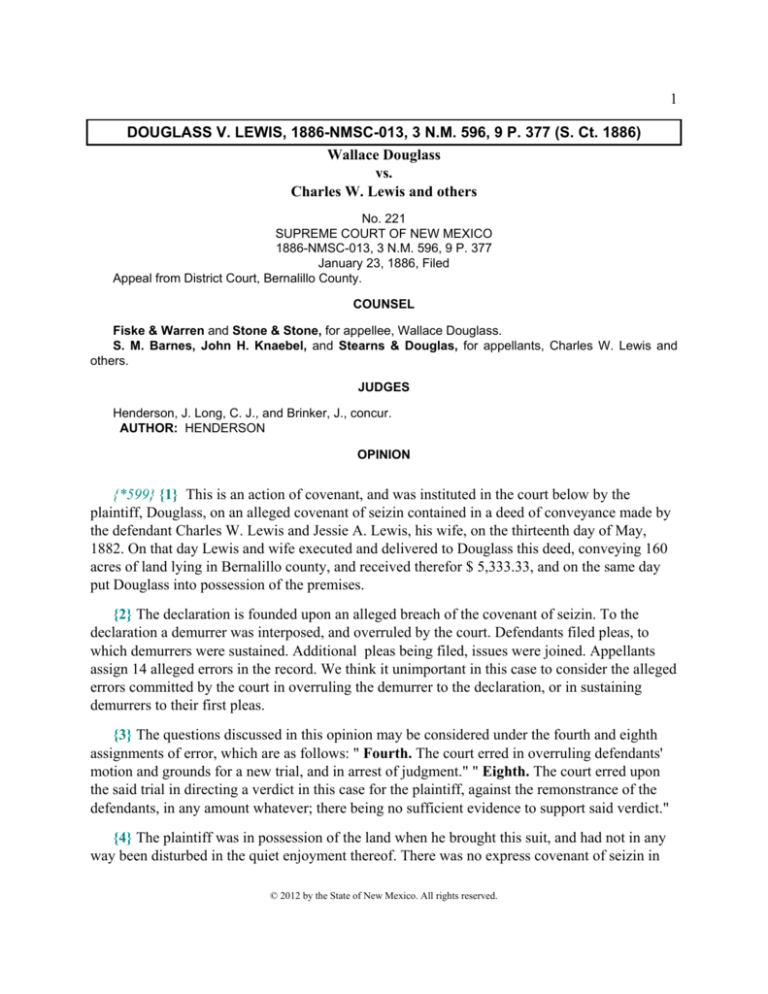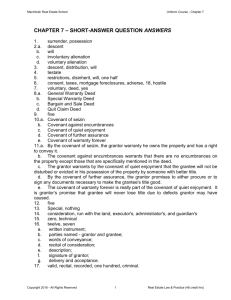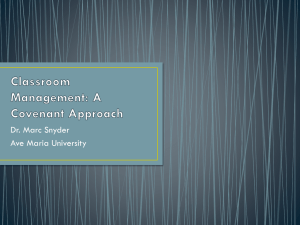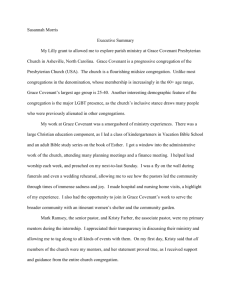
1
DOUGLASS V. LEWIS, 1886-NMSC-013, 3 N.M. 596, 9 P. 377 (S. Ct. 1886)
Wallace Douglass
vs.
Charles W. Lewis and others
No. 221
SUPREME COURT OF NEW MEXICO
1886-NMSC-013, 3 N.M. 596, 9 P. 377
January 23, 1886, Filed
Appeal from District Court, Bernalillo County.
COUNSEL
Fiske & Warren and Stone & Stone, for appellee, Wallace Douglass.
S. M. Barnes, John H. Knaebel, and Stearns & Douglas, for appellants, Charles W. Lewis and
others.
JUDGES
Henderson, J. Long, C. J., and Brinker, J., concur.
AUTHOR: HENDERSON
OPINION
{*599} {1} This is an action of covenant, and was instituted in the court below by the
plaintiff, Douglass, on an alleged covenant of seizin contained in a deed of conveyance made by
the defendant Charles W. Lewis and Jessie A. Lewis, his wife, on the thirteenth day of May,
1882. On that day Lewis and wife executed and delivered to Douglass this deed, conveying 160
acres of land lying in Bernalillo county, and received therefor $ 5,333.33, and on the same day
put Douglass into possession of the premises.
{2} The declaration is founded upon an alleged breach of the covenant of seizin. To the
declaration a demurrer was interposed, and overruled by the court. Defendants filed pleas, to
which demurrers were sustained. Additional pleas being filed, issues were joined. Appellants
assign 14 alleged errors in the record. We think it unimportant in this case to consider the alleged
errors committed by the court in overruling the demurrer to the declaration, or in sustaining
demurrers to their first pleas.
{3} The questions discussed in this opinion may be considered under the fourth and eighth
assignments of error, which are as follows: " Fourth. The court erred in overruling defendants'
motion and grounds for a new trial, and in arrest of judgment." " Eighth. The court erred upon
the said trial in directing a verdict in this case for the plaintiff, against the remonstrance of the
defendants, in any amount whatever; there being no sufficient evidence to support said verdict."
{4} The plaintiff was in possession of the land when he brought this suit, and had not in any
way been disturbed in the quiet enjoyment thereof. There was no express covenant of seizin in
© 2012 by the State of New Mexico. All rights reserved.
the deed, but there was both a special and general covenant of warranty. {*600} The contention
of the plaintiff is that the deed contained an implied covenant of seizin by force of the terms of a
statute in force at the date of the execution of the deed, and so the court below held and directed
the jury to find for him and assess his damages at the sum paid for the land. It will serve no
useful purpose to state what the facts were as shown by the evidence at the trial.
{5} The statute relied on by the plaintiff is as follows, (section 2750, Comp. Laws 1884:)
"The words 'bargained and sold,' or words to that effect, in all conveyances of
hereditary real estate, unless restricted in express terms on the part of the person
conveying the same, himself and his heirs, to the person to whom the property is
conveyed, his heirs and assignees, shall be limited to the following effect: First, that the
grantor, at the time of the execution of the conveyance, is possessed of an irrevocable
possession in fee-simple to the property so conveyed. Second, that the said real estate at
the time of the execution of said conveyance is free from all incumbrances made, or
suffered to be made, by the grantor, or by any person claiming the same under him.
Third, for the greater security of the person, his heirs and assignees, to whom the said
real estate is conveyed by the grantor and his heirs, suits may be instituted the same as if
the conditions were stipulated in the said conveyance."
{6} Appellant's counsel contends that this section is so uncertain and obscure that it must be
declared void. That there is some obscurity and uncertainty growing out of the use of several
words and phrases in this section cannot be denied. The rule of law on this subject may be stated
as follows: Where the statutory terms are of such uncertain meaning or so confused that the
courts cannot discern with reasonable certainty what is intended, they will be declared void.
McConvill v. Jersey City, 39 N.J.L. 38; {*601} Cheezem v. State, 2 Ind. 149; King v. State, 2
Ind. 523; Sullivan v. Adams, 69 Mass. 476, 3 Gray 476; State v. Liedtke, 9 Neb. 468, 4 N.W.
61; State v. Craig, 23 Ind. 185; Bish. Writ. Law, 41.
{7} Courts will not, however, declare an enactment void on account of slight inaccuracies of
expression. Evans v. Com., 44 Mass. 453, 3 Met. 453; Haynes v. State, 24 Tenn. 120, 5 Hum.
120; State v. Cooper, 5 Day 250; People v. Shepard, 36 N.Y. 285.
{8} The cardinal rule in the interpretation of statutes is to ascertain, if possible, the legislative
purpose or intention in the enactment of a law. This rule is of such universal recognition that we
will not cite authorities in its support.
{9} This statute was enacted in 1852. We are warranted in looking back to that period to
ascertain the surroundings of the legislature, the language in which the act was passed, the
difficulty and improbability of a verbally correct translation into English, and determine by these
and other considerations what was meant by the use of the words and somewhat obscure phrases
employed in the section as it now appears in the statutes of the territory.
{10} It is conceded that the legislature undertook to pass an act, of which the section was a
part, on the subject of the conveyance of real estate, and to copy a statute then in force in the
state of Missouri on that subject. The statute was passed in the Spanish language, and has
undergone several translations into English. It will be seen that there was an effort to translate an
English statute into Spanish, and to enact it in that tongue, and again translate it into English,
without any special care being taken to reproduce the statute into English exactly in terms as
originally found in Missouri. We think it reasonably certain that the phrase "hereditary real
estate" means "real estate of inheritance;" again, "possessed of an irrevocable possession {*602}
in fee-simple" with like reasonable certainty means "seized of an indefeasible estate in
fee-simple;" and that "limited to the following effect" may be read "construed to the following
effect." If this be true, we have ascertained with that degree of certainty the meaning of the
statute that makes it our duty to uphold and enforce it.
{11} In Armijo v. New Mexico Town Co., 3 N.M. 427, 5 P. 709,1 at the last term, Chief
Justice Axtell, in delivering the opinion of the court, went outside of the question properly before
it, and in a dictum declared this section void. There was no concurrence by any other member of
the court in his views on this subject. Hence it need not be considered as in any sense binding.
Having disposed of the objection to the validity of the statute, we will look into the record to
ascertain whether the pleadings and proofs on the part of the plaintiff were such as to justify the
court below in directing the jury to find for him.
{12} The contention of appellant's counsel is that inasmuch as there is no express covenant of
seizin in the deed, and that there is a covenant of warranty, the covenant of warranty must be
construed and treated as a limitation and restriction in legal effect, in express terms, upon their
liability as grantors in the deed.
{13} This view was adopted by the supreme court of Mississippi. In Weems v. McCaughan,
7 Smedes & M. 422, Sharky, J., in delivering the opinion of the court, said: "The covenant
raised by law from the use of particular words in the deed are only intended to be operative when
the parties themselves have omitted to insert covenants. But when the party declares how far he
will be bound to warrant, that is the extent of his covenant. The law will not hold him bound
beyond it." See Cruise, Real Prop. 449; Vanderkarr v. Vanderkarr, 11 Johns. 122; Brown v.
Smith, 6 Miss. 387, 5 Howard 387.
{*603} {14} Finley v. Steele, 23 Ill. 56, is also directly in point. This case approves the rule
laid down in Weems v. McCaughan, supra, and in addition thereto states many reasons, as we
think, of the highest public importance why an implied covenant ought not to exist in such cases.
{15} It is very well known that the words "grant, bargain, and sell" at common law had no
technical meaning attached to them. They have never been held to imply a covenant of any kind,
unless under statutory enactment, although they have been generally used in the granting clause
in conveyances.
{16} It is true that the words employed in a deed must be construed most strongly against the
grantor. This rule, however, ought not to be adopted here for the reason that the statute is in
derogation of the common law, and should be construed strictly.
{17} As said by the Illinois court, "there is scarcely a court before which this statute has
come for construction that has not characterized it as a provision of dangerous tendency,
calculated to entrap the ignorant and unwary into liability which they never intended to incur."
Finley v. Steele, 23 Ill. 56. See, also, Collier v. Gamble, 10 Mo. 467. Had Lewis written out
this statutory covenant, and put it into his deed, and had also inserted the covenant of warranty, it
would present a very different question, as by that act it would appear to have been his intention
that both covenants should be operative. In such case, the court would enforce both, and thereby
give effect to the intention of the parties.
{18} Rawle on Covenants for Title, at page 492, in discussing the effect upon an implied or
statutory covenant by the insertion of an express covenant of general warranty, says: "The effect
of this is, of course, to deny to a purchaser the benefit of the statutory covenant for seizin when
he has also received an express {*604} covenant of warranty, and under such circumstances it
would seem that there could never be a recovery without an eviction."
{19} As there is no pretense in this case of an eviction, or any claim whatever of a breach of
the covenant of warranty, it follows that the action cannot be maintained, and that it was error in
the court below to order a verdict for the plaintiff, and in overruling the motion in arrest of
judgment. For these errors the judgment is reversed, and cause dismissed, with costs of both
courts to appellee.
OPINION FOOTNOTES
1 Same case, ante, 244.
——————————










